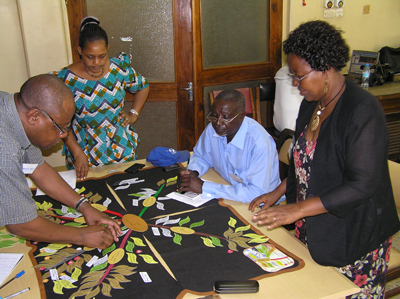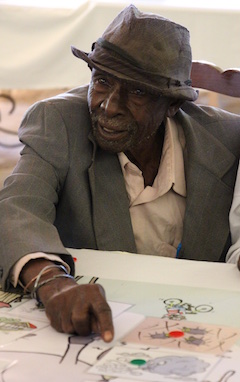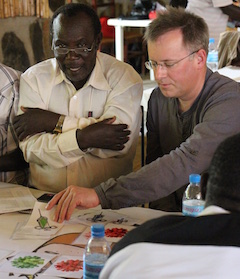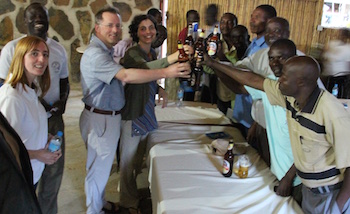Foot-and-mouth disease control in Tanzania
Foot-and-mouth disease (FMD) is one of the most important diseases affecting livestock production and trading globally. The study of FMD in traditional livestock-keeping systems in sub-Saharan Africa has received little attention and, as a consequence, FMD remains poorly controlled in most of the continent. The Boyd Orr Centre for Population and Ecosystem Health (BO) and partners, including The Pirbright Institute (TPI) and the University of Edinburgh in the UK, and Tanzania-based partners (Sokoine University of Agriculture [SUA], Tanzania Wildlife Research Institute, and Ministry of Livestock and Fisheries Development) have been studying FMD in north-western Tanzania since 2010 to better understand the epidemiology and impacts of the disease on livestock-dependent communities, and to devise strategies for its control.
Two workshops were held in Tanzania, aimed at rendering research carried out so far accessible to policy- and community-level stakeholders, and at developing joint research and policy agendas for sustainable livestock development in Tanzania through better FMD control.
Policy workshop
 The first workshop took place on Wednesday 15th April and Thursday 16th April 2015 at SUA, Morogoro (southern Tanzania). We gathered representatives from all stakeholder groups concerned with FMD and its control, including those driving current policy development in Tanzania, such as the government, the commercial and traditional livestock systems, and the wildlife sector.
The first workshop took place on Wednesday 15th April and Thursday 16th April 2015 at SUA, Morogoro (southern Tanzania). We gathered representatives from all stakeholder groups concerned with FMD and its control, including those driving current policy development in Tanzania, such as the government, the commercial and traditional livestock systems, and the wildlife sector.
We also invited selected international livestock development and health institutions (including the Food and Agriculture Organization) and partner UK-based research institutions (BO, University of Edinburgh, and TPI).
The workshop was aimed at identifying the economic, political & social incentives, and the benefits & drivers of FMD control in Tanzania in a nationally sustainable livestock development context, taking into account the views and perspectives of a range of stakeholders. We also explored possible barriers (e.g. epidemiological, economic, operational, political or social) to identify key research and development options to fit the needs and capacities of different stakeholders.
We communicated the results from research carried out in Tanzania so far through an active engagement session with participants, and we collected feedback that will help us to determine the policy relevance and implications of this research and how to address some of the barriers identified. The workshop report is available here.
Workshop organisers: Tiziana Lembo (BO), Brian Perry (University of Edinburgh), and Rudovick Kazwala (SUA).
Funders: BBSRC / DFID / Scottish Government (Combating Infectious Diseases of Livestock for International Development initiative) funded the original research. The workshop was funded through a Wellcome Trust costed extension to the Afrique One consortium, contributions by MSD Animal Health to the University of Glasgow, and the Boyd Orr Centre for Population and Ecosystem Health.
Contact for information: Tiziana Lembo
 Community workshop
Community workshop
The second workshop on 21st – 23rd April was held in Mugumu, Serengeti District (northern Tanzania), where BO has well-established FMD surveillance and research platforms. The workshop gathered a range of stakeholders, including government-level representation (district veterinary and livestock field officers), village leaders, livestock owners, and project members and UK-based partnering research institutions (BO and TPI).
The workshop engaged with local communities directly to ensure their continued involvement in FMD research and, critically, in decision-making processes. This has been key to establishming a sense of ownership of the research findings and solutions, and of increasing responsibility for FMD reporting and control in their own communities. Within a very interactive and open discussion space, we reviewed the epidemiological situation for FMD in the area, as well as available prevention mechanisms. We also discussed the role that individual owners and the community more widely can play in FMD reporting and prevention.

We then looked at what the incentives and barriers to putting this knowledge into practice might be. This included the perspective of the livestock owners and the stakeholders who would need to be involved in FMD prevention at the government or local level. We also looked at what their motivation / barriers to get involved might be, who amongst these stakeholders might link things up in a way that would ensure sustainability, and what the motivation for livestock keepers and local governments might be in terms of contributing financially.
The workshop ended with an informal discussion of how to continue to work together in the future. A report of the workshop is available here.

Workshop organisers: Tiziana Lembo and Richard Reeve (BO), and Veronica Fowler and Kasia Bankowska (TPI).
Funders: BBSRC / DFID / Scottish Government (Combating Infectious Diseases of Livestock for International Development initiative) funded the original research. The workshop was funded by MSD Animal Health, a Wellcome Trust costed extension to the Afrique One consortium, the Boyd Orr Centre for Population and Ecosystem Health, and a BBSRC Sparking Impact award.
Contact for information: Tiziana Lembo
As a veterinary epidemiologist, I have interests in a wide range of zoonotic and multi-host pathogens. I have worked mainly in Tanzania on diseases such as rabies, bovine tuberculosis, anthrax and canine distemper, developing new diagnostic and epidemiological approaches to address disease problems from the perspectives of public health, livestock development and wildlife conservation.
- Institute of Biodiversity, Animal Health and Comparative Medicine, CMVLS and The Pirbright Institute
I am a mathematical modeller who has moved into the life sciences to study diversity. My work focusses on developing the connections between different fields that use diversity measures, and I am especially interested in the connections between the fields, which analyse it from the level of the transcript to the ecosystem, and the underlying mathematics. Much of my work is on the application side, where I work on understanding how to measure similarity of individuals for integration into similarity-sensitive diversity measures, with a particular focus on antigenic similarity of viruses, especially foot-and-mouth disease and flu.

